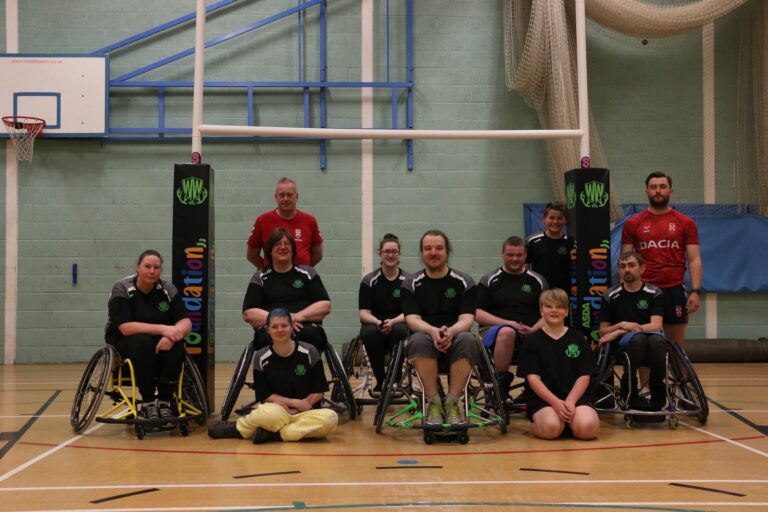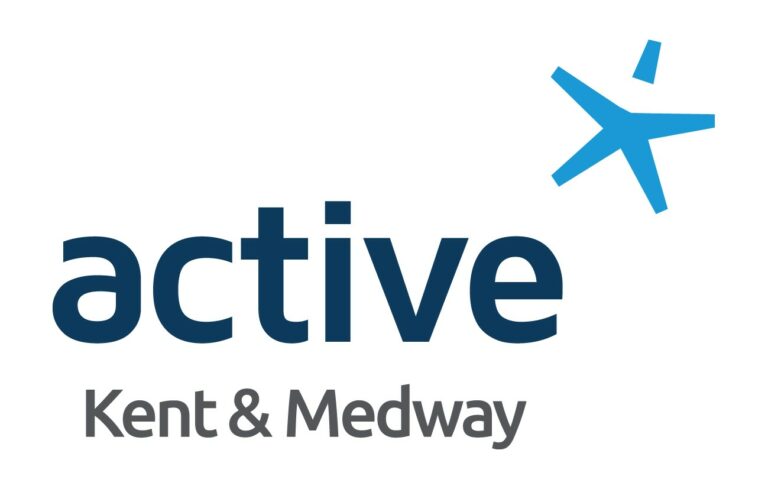Spotlight on: Including Disabled People
Introduction
“Disabled people remain the least active in every community. This shows the deep-rooted barriers that exist and for this to change, we cannot do it alone”. Activity Alliance Annual Disability and Activity Survey 2023-24.
Sport England Active Lives Adult data from 2022-2023 (published in April 2024) showed that 48% of disabled people in Kent and Medway were considered to be active. This means that 52% of disabled people in the county are currently not reaching desired activity levels to significantly benefit their health.
Our Spotlight on: Including Disabled People highlights the benefits of physical activity for disabled people and showcases some of the resources available to encourage organisations to offer more inclusive sessions. We hope you find the following resources and articles of interest.
Disabled People and Physical Activity
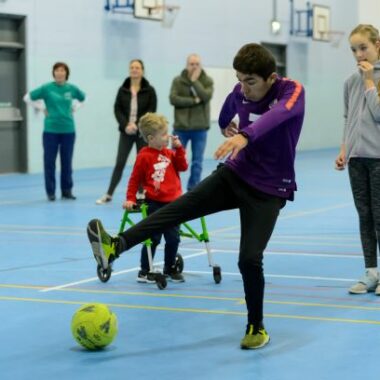
Activity Alliance, the national charity and leading voice for disabled people in sport and activity, has gathered useful statistics on disabled people.
- Disabled people and people with long-term health conditions are almost twice as likely to be physically inactive compared to non-disabled people.
- A significant ‘activity gap’ remains, only four in 10 (43%) disabled people feel they have the opportunity to be active as they want to be.
- Three-quarters (76%) of disabled people express a desire to be more active.
- The top motivation to be active continues to be about being healthy.
- There is a consistent fear that being active will result in benefits or financial assistance being taken away. 38% of disabled people have this fear.
- Only 9% of disabled people agree they have the opportunity to become a coach or take on a role in delivering sport or physical activity.
- Less than half of disabled people say it is easy for them to physically access outdoor spaces.
Follow this link to access Activity Alliance’s Facts and Stats
Physical Activity Guidelines
For Disabled Adults
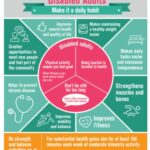 The UK Chief Medical Officers’ guidelines recommend that disabled adults aim for at least 150 minutes each week of moderate intensity activity. Strength and balance activities on a least two days per week is also recommended.
The UK Chief Medical Officers’ guidelines recommend that disabled adults aim for at least 150 minutes each week of moderate intensity activity. Strength and balance activities on a least two days per week is also recommended.
Being inactive is harmful to health so even a little movement is better than nothing.
Follow this link to download the full guidelines (PDF)
For Disabled Children and Disabled Young People
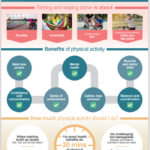 The UK Chief Medical Officers’ guidelines recommend that disabled children and disabled young people should aim for 20 minutes of physical activity per day for good health benefits. Strength and balance activities three times are week are also recommended.
The UK Chief Medical Officers’ guidelines recommend that disabled children and disabled young people should aim for 20 minutes of physical activity per day for good health benefits. Strength and balance activities three times are week are also recommended.
When starting, build up slowly. Small amounts of activity are good so do bitesize chunks throughout the day.
Benefits of Physical Activity for Disabled People
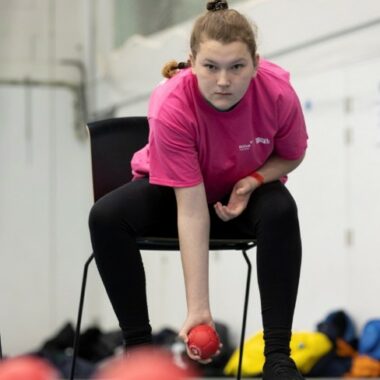
For adults, being physically active improves mental health and quality of life. It makes maintaining a healthy weight easier and makes daily tasks easier. It also increases independence, strengthens muscles and bones, improves mobility and balance and helps to prevent chronic disease. Taking part in physical activity sessions also creates opportunities to meet new people and feel part of the community.
For children and young people, physical activity can improve confidence and concentration. It can provide a sense of achievement, improve mental health and support motor skill development.
Activity Alliance offer advice and resources to help engage disabled people and people with long-term health conditions, inclusively and accessibly.
National Support and Resources
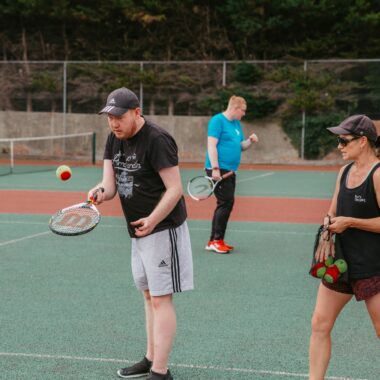
Activity Alliance – Talk to Me Report
“Easy to read and a great place to start.”
The Talk to Me report (published 2014) is full of meaningful insights for providers to consider to enhance the opportunities offered to disabled people. The report findings established three key principles:
- Step One: Drive awareness (use communication channels I trust and stay local to me)
- Step Two: Engage the audience (don’t lead with my impairment or condition and talk to my values)
- Step Three: Offer support and reassurance (make me feel I can do it, ensure my first experience is good, reassure me I’m going to fit in)
Follow this link to view the Talk To Me report
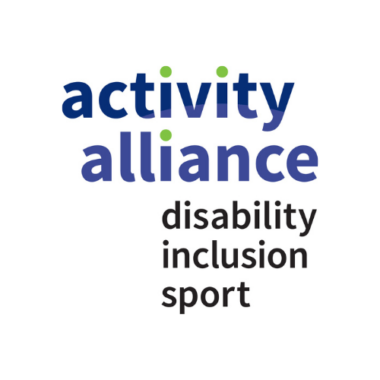
Buddle – Disability Inclusion Club Hub
“Helpful for digging deeper and reviewing what’s in place.”
Activity Alliance have created this tool in partnership with Sport England’s Buddle to see how inclusive and accessible your organisation is when meeting the needs of disabled people, and where changes can be made to improve your offer.
Being a successful organisation means being inclusive and accessible to everyone. All participants and volunteers need to feel valued and have equal access to participation or volunteering opportunities. The disability inclusion club hub is free to access but you must have a Buddle account to sign in.
Follow this link to access Sport England’s Inclusion Club Hub
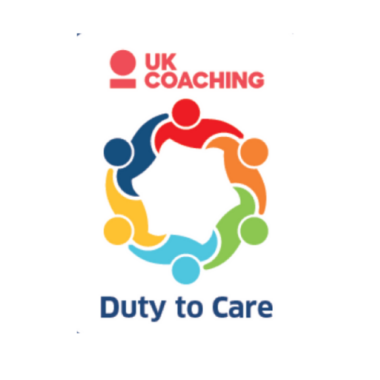
UK Coaching Duty to Care Digital Badge
“Celebrate and demonstrate what you’re doing well.”
The UK Coaching Duty to Care Digital Badge provides evidence of your commitment to the six pillars of Duty to Care, which will help you to provide great physical activity opportunities and offer your participants crucial support on their journeys.
The six pillars are: Diversity | Inclusion | Mental Health and Well-being | Physical Well-being | Safeguarding | Safe to Practice.
Follow this link to find out more about the Duty to Care badge
National and Local Campaigns
We Are Undefeatable
A campaign inspiring and supporting people with long-term health conditions to build physical activity into their lives.
Follow this link to find out more and to become a supporter
Who Says?
For far too long disabled people have faced misconceptions and presumptions on what is and isn’t possible, including in sport. Activity Alliance wants to move conversations on, open people’s minds and shift out-dated views on disability. Join the conversation and be a part of the campaign on social media – share the films and add your voice by posting your own experiences using #WhoSays.
Follow this link to find out more about the Who Says? campaign
Get Out Get Active
Get Out Get Active (GOGA) began in 2016 and is a programme created to bring disabled and non-disabled people together to be active. It looks to engage the least active communities in fun and inclusive ways. At a local level, GOGA in Action is being delivered in Dover.
Local Support and Resources
Activity Finders
Activity Hubs/Finders provide people with information about a range of activities in their area, so they can find the ones that suit their individual needs. Promoting your inclusive sessions through these hubs can help you to reach new audiences.
Follow this link to add your activities to the Activity Finder
Tackling Inequalities
Read about the impact of our work in supporting partners to tackle inequalities and to provide more opportunities for disabled people to take part in sport and physical activity. Watch the short film below to hear how Whitstable Lawn Tennis Club offer inclusive tennis sessions for the local community to tackle inactivity, reduce isolation and to enable participants to make friendships and reconnect with each other.
Additional Support and resources
Contact Us
If you’d like to discuss any of the above articles or would like any further information, please get in touch with the team at activekent@kent.gov.uk

